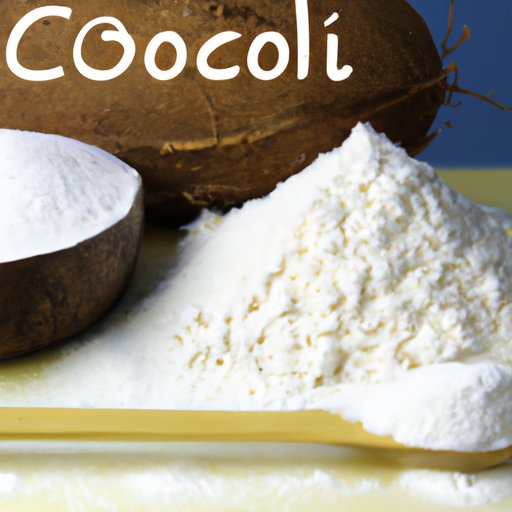Introduction
Coconut flour is a type of flour made from ground and dried coconut meat. It has become increasingly popular as an alternative to traditional wheat-based flours due to its gluten-free status and potential health benefits. But is coconut flour healthy? In this article, we’ll explore the nutritional benefits and risks of coconut flour and discuss how it can fit into a healthy diet.

Analyzing the Nutritional Benefits of Coconut Flour
Coconut flour is high in fiber and protein, low in carbohydrates and fat, and contains a variety of vitamins and minerals. A one-quarter cup (30 grams) serving contains approximately:
- 120 calories
- 4 grams of fat
- 5 grams of protein
- 18 grams of carbohydrates
- 10 grams of dietary fiber
- Iron
- Magnesium
- Phosphorus
- Potassium
- Vitamin C
According to a study published in the journal Food Chemistry, coconut flour is also a good source of antioxidants, which may help reduce inflammation and protect against chronic diseases like heart disease and cancer.
Exploring the Health Risks and Benefits of Coconut Flour
While coconut flour does have some potential health benefits, there are also some potential risks associated with its consumption. One of the main concerns is that coconut flour may cause allergies or sensitivities in some people. If you have a coconut allergy, it’s important to avoid coconut flour.
Another potential concern is that coconut flour may be contaminated with mold, bacteria, or other toxins. To reduce the risk of contamination, look for coconut flour that has been certified organic and stored in a cool, dry place.
Comparing Coconut Flour to Other Types of Flour
When it comes to gluten-free flours, coconut flour is not the only option. Other options include almond flour, oat flour, and rice flour. Each type of flour has its own unique nutrition profile and can be used in different recipes.
Almond flour is higher in fat and calories than coconut flour, but it is also higher in protein and lower in carbohydrates. Oat flour is higher in carbohydrates, but it is also higher in fiber and certain vitamins and minerals. Rice flour is higher in carbohydrates, but it is also higher in certain minerals, including iron and magnesium.

Examining the Role of Coconut Flour in a Healthy Diet
Coconut flour can be a great addition to a healthy diet. It’s low in carbohydrates, so it’s a good option for those following a low-carbohydrate diet. It’s also high in dietary fiber, which can help support digestive health and keep you feeling full for longer.
Investigating the Pros and Cons of Coconut Flour
Overall, coconut flour can be a nutritious addition to your diet. However, there are some pros and cons to consider before incorporating it into your meal plan. Here are some of the advantages and disadvantages of using coconut flour:
- Pros: Coconut flour is high in fiber and protein, low in carbohydrates, gluten-free, and a good source of several vitamins and minerals. It can also be used as a substitute for wheat flour in many recipes.
- Cons: Coconut flour may cause allergies or sensitivities in some people and may be contaminated with mold, bacteria, or other toxins. It’s also more expensive than other types of flour.

Understanding the Impact of Coconut Flour on Blood Sugar Levels
It’s important to consider the impact of coconut flour on blood sugar levels. Coconut flour has a low glycemic index, meaning it won’t cause a rapid spike in blood sugar levels. According to a study published in the journal Diabetes Care, consuming coconut flour can also help improve insulin sensitivity.
Conclusion
In conclusion, coconut flour can be a nutritious addition to a healthy diet. It’s high in fiber and protein, low in carbohydrates, and a good source of several vitamins and minerals. However, it may cause allergies or sensitivities in some people and may be contaminated with mold, bacteria, or other toxins. Additionally, it’s important to consider the impact of coconut flour on blood sugar levels. With careful consideration, coconut flour can be a beneficial part of a healthy diet.
(Note: Is this article not meeting your expectations? Do you have knowledge or insights to share? Unlock new opportunities and expand your reach by joining our authors team. Click Registration to join us and share your expertise with our readers.)
